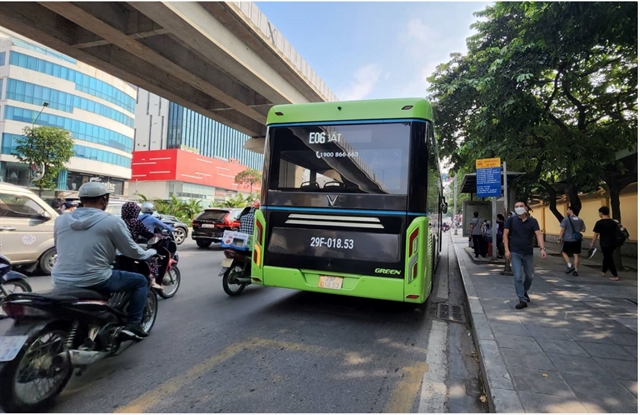 Society
Society

 |
| An electric bus on a street in Hà Nôi. — VNA/VNS Photo |
HÀ NỘI — The municipal authority of Hà Nội is planning to implement a roadmap to convert all gasoline-powered buses to electric buses under the direction of the Government.
After about nine months of trial operation, nine electric bus routes, which use modern technology and provide convenient services connecting urban areas, are attracting an increasingly number of passengers.
Many passengers who regularly use electric buses have expressed their satisfaction with the quality of services, especially for its spaciousness and cleanliness, reasonably arranged seats, large windows, and modern and safe equipment.
The Government issued Decision 876/QĐ-TTg this year approving the Action Programme on Green Energy Transformation, Carbon and Methane Emissions Reduction in Urban Transport from 2025. Accordingly, 100 per cent of petrol-powered buses will be replaced by those run by electricity and green energy.
At present, the rate of public passenger transport in Hà Nội reaches 45-50 per cent.
The city has set a goal that from 2030, the rate of vehicles using electricity and green energy will reach at least 50 per cent and 100 per cent of taxi cabs will use electricity and green energy.
And by 2050, all buses will use electricity and green energy and the rate of public passenger transport in special urban centres and urban centres of grade 1 will reach at least 40 per cent and 10 per cent, respectively.
According to a report by the Hà Nội Public Transport Management Centre, in the first six months of the year, electric bus routes transported more than 122 million passengers, and the number of passengers is constantly increasing.
Thái Hồ Phương, the centre’s deputy director, said that this year Hà Nội opened six new electric bus routes, including Hào Nam – Ocean Park urban area, Giáp Bát bus station – Ocean Park urban area, Long Biên – Cửa Nam – Smart City urban area, the Hà Nội departments complex area – Times City urban area, Smart City urban area – Hồ Tây water park, and Smart City urban area – Vincom Long Biên urban area.
Three electric bus routes operated from 2021 including Mỹ Đình Bus Station – Ngã Tư Sở – Ocean Park urban area, Mỹ Đình – Thái Hà – Ocean Park urban area, and Long Biên – Cầu Giấy – Smart City urban area.
The city plans to open other routes in coming years, Phương said.
Meanwhile, transportation experts said that electric buses help reduce greenhouse gas emissions sustainably and better protect the environment.
This type of vehicle also plays an important role in providing a more modern transport service than a petrol-powered bus, contributing to a reduction of personal vehicles.
According to statistics of the Hà Nội Transport Corporation (Transerco), the company is operating 83 bus routes and one bus rapid transport (BRT) line with a total of nearly 1,100 vehicles.
Since 2016, Transerco has invested in nearly 600 new buses with Euro 3 and 4 emission standards to replace old vehicles.
The number of vehicles under five years old is currently about 800, accounting for over 73 per cent of the total number of vehicles.
The Transerco expects 225 vehicles will be eligible to be switched to electric buses from 2025, accounting for 21.3 per cent of the existing fleet.
Transerco also requested the Department of Transport to report to the Hà Nội People's Committee to consider mechanisms and policies to support businesses, and arrange funds for companies operating electric buses and infrastructure serving electric buses.
The committee should direct power companies to support the plan of supplying large-capacity power sources to operate electric vehicle charging stations, especially at emergency points on the road. — VNS